|
Engine tournaments (with humans) |

|

|
|
|
Engine tournaments (with humans) |

|

|
Engine tournaments (with humans)
Menu Engine – Tournament
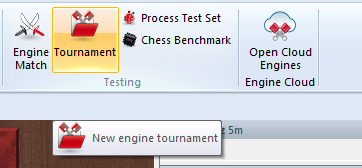
Matches between two engines have a disadvantage: program A might win easily against program B but have problems against program C, even though program C can beat program B. This is less probable among human players. To accurately measure a program’s strength it has to play against a wide variety of opponents. The easiest way to do this is round robin tournaments.
The program does this automatically. You invite engines to a tournament with their opening books, specify a time control and leave the program to itself. If you need to use the computer in the meantime you can interrupt the tournament and resume it later.
You can use the menu Engine – Tournament to invite engines to an engine tournament.
You must choose the name of a tournament (with the extension .cbtourn) which will contain the data of the engines that are participating.
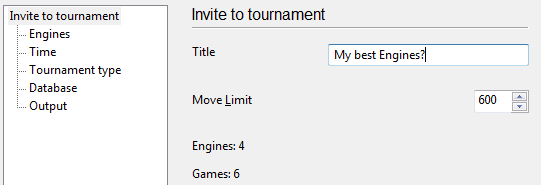
Title: The text that you input is saved in the games as the "Tournament".
Dialog Engines
You can choose from the engines installed on your system. For each engine, you can select an openings book, set the book and engine options, hash table size, etc.

Unify Book: All the engines are to play with the same openings book.

Unify Hash: All the engines should have the same size hash tables.
Dialog Time
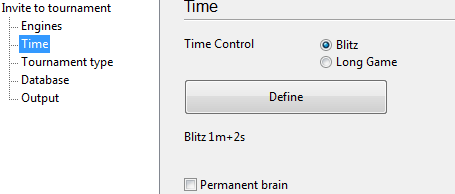
Blitz: The tournament is carried out with blitz games.
Long game: The tournament is carried out with games that use classical time controls.
Permanent Brain: Use opponent’s time: The engines are allowed to think while it is the opponent’s turn. This uses 50% of the processor time.
Dialog Tournament Type
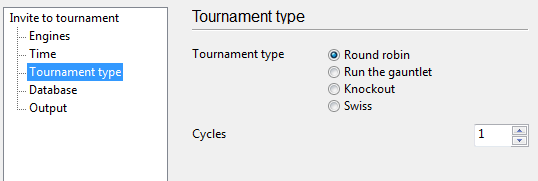
| • | Cycles: This specifies how many games each player should play against each opponent. This is the number of rounds in the Swiss system. |
| • | Round robin: Every engine plays as many games against each opponent as are specified by the cycles. |
| • | Run the gauntlet: The first engine in the list plays as many games against each opponent as are specified by the cycles. This is useful for testing individual engines. |
| • | Knockout: Engines play against each other in pairs. The winner advances to the next round. |
| • | Swiss System: In each round engines with approximately the same point score play against one another. After a few rounds the strongest engines are playing one another and the weakest engines are playing against one another. As many rounds are played as there are cycles. |
Dialog Database
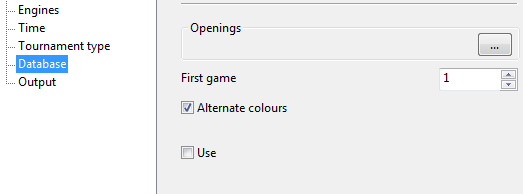
"Database" specifies which database should be used for the selection of openings.
"Alternate colours" changes the colours for every game.
Dialog Output

"Output" specifies the database in which the games of the engine tournament are to be stored.
Tournament database
The program saves all engine tournaments automatically in a tournament database. You will find this in the directory c:\My documents\ChessBase\CompBase\EngTourn,unless specified otherwise during the installation of the program. The tournament database is always shown in the history list of the database window.